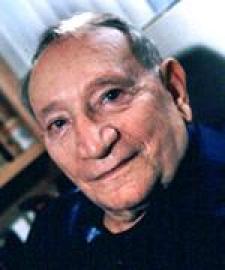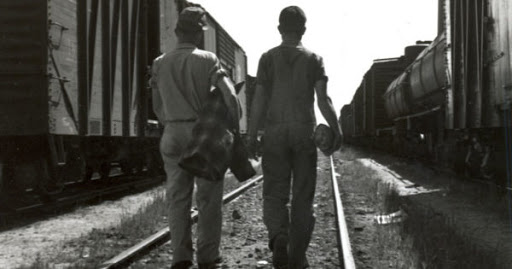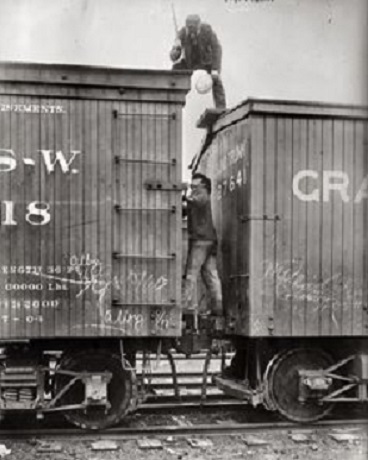The American writer and playwright Dale Wasserman was born in Wisconsin, 1914, the child of Russian immigrants Samuel Wasserman and Bertha Paykel, and was  orphaned at the age of nine. He lived in a state orphanage and with an older brother in South Dakota before he “hit the rails”. He later said, “I’m a self-educated hobo. My entire adolescence was spent as a hobo, riding the rails and alternately living on top of buildings in downtown Los Angeles. I regret never having received a formal education. But I did get a real education about human nature.” In this abridged short story he describes his own experiences including near death at the hands of a ‘yard bull’ (Railroad security guard).
orphaned at the age of nine. He lived in a state orphanage and with an older brother in South Dakota before he “hit the rails”. He later said, “I’m a self-educated hobo. My entire adolescence was spent as a hobo, riding the rails and alternately living on top of buildings in downtown Los Angeles. I regret never having received a formal education. But I did get a real education about human nature.” In this abridged short story he describes his own experiences including near death at the hands of a ‘yard bull’ (Railroad security guard).
“In the rigid order of the Road., a hobo ranked high. It must be understood that he was not a tramp. A tramp might be a thug, a jackroller, a punch-drunk boxer, or a yegg on the lam. The Road, among its other attractions, was a refuge from the law.
Nor was a hobo a bum. A bum hung out on Chicago’s West Madison Avenue and panhandled the stem. In the hobo jungles he might be seen squeezing Sterno Canned Heat through an old sock to extract the grain alcohol. Hoboes disdained tramps, felt nothing warmer than pity for bums, and avoided both.
For what defines the hobo is that he worked. The great majority of hoboes (at least until the Depression struck) were skilled at a host of occupations. Lumberjacks, cigar-rollers, woodchoppers, construction stiffs, fruit and vegetable pickers, barley buckers, short-order cooks, merchant mariners . . . name it, and there were hoboes who could do it. They wouldn’t do it for long, however. The Road was home; other domiciles were temporary..
The population of the Road itself numbered many who were dangerous to others. There were prison escapees and ex-cons. Lunatics were common.
One learned to keep a wary distance, to wake instantly from sleep and hit the ground running, especially if one was a “gaycat,” a young apprentice like me.
But most dangerous of all were the trains themselves. There were precise techniques for flipping a freight and for the even more hazardous move, dropping off. Thousands of Road kids were killed or injured; there are no statistics numbering those who fell beneath the wheels. One may extrapolate from the figures of one railroad alone, the Missouri Pacific, which from 1930 (the year I started jumping freights) to 1932 recorded 330 trespassers killed and 682 seriously injured..
The Depression accounted for the fact that the Road belonged no longer to the young but to the dispossessed of all ages, no longer the life of those who’d chosen but of those who’d been deprived of any choice at all. They swarmed onto the freight trains, husbands, wives, children, in futile search for work, for a welcoming community, for an unlikely offer of food, friendship, compassion. Estimates of the numbers of homeless on the road at the depth of the Depression reached one million . . . two million. The truth is, no one knows.
I fear I may have given the impression that hoboing was an unending round of danger, discomfort, and anomie. Well, yes. But it offered so much more. Independence. Freedom, like none other on earth. Unexpected pleasures, astonishing sights. Ecstasy even, and the joy of wonders previously known only from rumour or from books..
Of all the gifts of hobo-dom, however, the sweetest and most dangerous is the freedom, that most abused word in the lexicon. To the wanderer alienated from society, it has precise and profound implications, fulfilling the sense of the Camus phrase ‘terrible freedom’.
As a hobo I was free of family pressures and responsibility—and free to endure the absence of support in the rites of passage enjoyed by a “normal” member of society. I was free of moral and behavioural restraints and free of the social accommodations that make living among one’s fellow folk possible. I was free of sexual education or modulation, and free to suffer the consequences in tainted relationships for decades to follow..
Unfortunately, (at times) I’ve misremembered the distinction between carefree and careless.
.On a humid summer’s evening, with soft dark rain falling in a railroad town between Rawlins and Rock Springs, Wyoming, I’ve spotted a road hog waiting on a siding, its lights and numbers up, ready to roll.
Now I’m strolling along, canvassing the cars of the red ball freight it will be hauling, checking for empties. A tall man, wearing a straw Stetson with a rolled brim, steps out from between two cars and beckons with his left hand: Come closer.
It’s too dark to see what he’s holding in his other hand. A gun? On the chance that it is, I check my first instinct, which is to run.
I’m reassured by the tall man’s eyes. They’re brown, they’re friendly. No danger signals. Nor in his voice when he speaks; concern, rather, and courtesy. In a soft Texas accent the tall man asks, “Headin’ out?” “Yup.” “On this train?” “I was figuring.”
The tall man nods, his manner almost mournful. “Y’all know you’re on railroad property?” I tense up. Run? But what’s concealed in his right hand? “I wasn’t fixing to steal anything.” “Said you was. Said you was goin’ to steal a ride on this here train.” “Well, I never figured that flipping a ride on a freight—”
I don’t see it coming. Only know a blinding flash of light, cold and scintillating. And a clang in my head followed by a fast, nauseating vibration. I’m lying on the ground. I raise my eyes to see, at last, the implement in the tall man’s right hand. Not a gun, a billy club perhaps fashioned from a sawed-off table leg. The fog clears from my eyes, and I can see more clearly now, can even make out the dull gray plug of metal at its business end. The billy has been cored with a half-pound of lead. Yard bull’s trick.
The pain has not yet reached its apex. What I feel is shame, shame in the stupidity of not recognizing danger while there was a chance to avoid it. The soft Texas voice, solicitous: “Y’all listenin’?” I summon up a whisper. “Yes, sir.” “Want you should pay note t’ this.”
I see it coming, and there’s not one damn thing I can do about it. There’s time, even, to note the steel capping of the yard bull’s boots as I am kicked, with precise aim, in the center of my ribs. I feel them crack and give. Breath is driven out, and now the pain is no longer shy; it washes over in a blinding wave, and to my own shame I cry out, “All right ,” as though it will interdict the beating. Through a mist I hear the warm, solicitous voice, “Kin yuh git up?” and I gasp, “No . . . no. . . ,” with an irrational expectation that now hostilities will cease, friendship be declared, and my wounds tended. “Git up or take the next one in the stomach.” The voice is no more emphatic than before, but I know it doesn’t mess around, it means it.
I struggle to my feet. The effort costs, a price paid in pain, in waves of nausea, in shame and fury. The yard bull faces me away from the tracks, south toward the empty hills. “Start walkin’,” he says. “And keep walkin’.”
The night has fully settled in by now, the soft drizzle persisting. I stumble on, unseeing, sick with pain. The rain stops. A few stars appear, even a blur of moon. The night seemingly has no end. Yet after an eternity or two there’s the beginning of light. I am out of sight of anything man-made, town, railroad, anything at all. Nothing but great, undulating hills. I’m aware principally of thirst.
The nightmare begins. It will last three, possibly four days. Hunger . . . one can live with hunger for a long time. But thirst . . . thirst is not passive. Thirst demands ..
I lift my eyes to see, silhouetted, the blocky figure of a man. Surely a mirage. But soon I’m being administered small sips of water..
It’s dark, and there’s a huge black pot simmering on a small fire, and the shepherder, grinning affably with squarish teeth set in a dark-skinned face, hands me a wooden bowl of mutton stew and speaks to me, but I think my ears or brain have been affected, for the language is a jumble of sounds. Later I learn that the man and the language are Basque.
I eat, drink water, and sleep long hours in a fleece-lined bedroll in the shadow of the shepherd’s wagon. The broken ribs are painful, but they’re healing (never set, they’ll be forever crooked). A scar across my right eyebrow will be a further reminder, and I have suffered sunstroke.
One day I’m on my feet, expressing shame at having so imposed on a stranger. The Basque seems to feel no imposition; indeed he has enjoyed the break in his isolation. But I insist, and he draws on the ground a map of sorts. There is a highway to the south and west, half a day’s walk..
I never stopped traveling, never fixed on a “permanent” address, even as (a writer) the funds to make that possible came in”.
(Thanks to American Heritage Magazine, 2001)